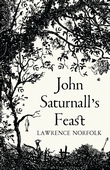 Published by Bloomsbury 13 September 2012
Published by Bloomsbury 13 September 2012
416pp, hardback, £16.99
Reviewed by Paul Sidey
‘A Capon is fit for the Table when the Smoke waves like a Rag in a Gale. Pheasants, Geese and Ducks must wait until the Juices run clear. A Pig is cooked when its Eyes pop out. But when a Kitchen Boy is ready for the Kitchen is a Question for subtler Doctors than I.’
Leaves from The Book of John Saturnall (a seventeenth-century recipe book, created by Norfolk’s leading character) are interspersed in antique type between the pages of this story – a story which has a fairytale familiarity. Young boy, his unique culinary gifts cultivated by his mother, becomes celebrated as a cook who has even prepared a dish for a sad-eyed Charles I.
This is just the first course of a novel rich in tastes, odours and colours. In the great house lives a young woman, the Lady Lucretia, daughter of William Buckland, who cannot inherit the property and lands pertaining unless she marries a callow young nobleman with the face of a water-parsnip. She would rather fast unto death than submit to a wedding feast.
Norfolk is an author who proceeds at his own considered pace, as witness the slow build-up of this story, where John finds himself bullied and ostracized by other children in his superstitious village. People believe his mother Susan to be a witch. And, inevitably, the moment comes when she and her son are chased away and their house burned to the ground.
As a very special part of his education, Susan introduces her boy to a magical book which relates the secrets of an ancient Feast, which harks back to another Good Book, where an Edenic state once existed…
After his mother’s death, John finds work in the kitchen of Buckland Manor. He can identify individual ingredients in a fish and lamprey broth – mace, coriander, cumin, marjoram, rue, honey, lemon… The pace hots up. He will fall for the daughter of the house. Civil War will blight their world, but love will find a way.
After his 1991 debut, Lempriere’s Dictionary, Lawrence Norfolk was included in Granta‘s Twenty Best Young British Writers. He has more than justified his place. He is an author who communicates a profound relish in the traditional business of storytelling, in the flavour as well as the look and sound of words. He is a Masterchef at reinventing fabled dishes, and, even if we know more or less what to expect from the story he tells, Norfolk constantly titillates the palate with narrative zest.
It has been twelve years since this author produced his last work, The Shape of the Boar. Lawrence Norfolk’s new book serves up a real banquet and has been well worth the wait.
